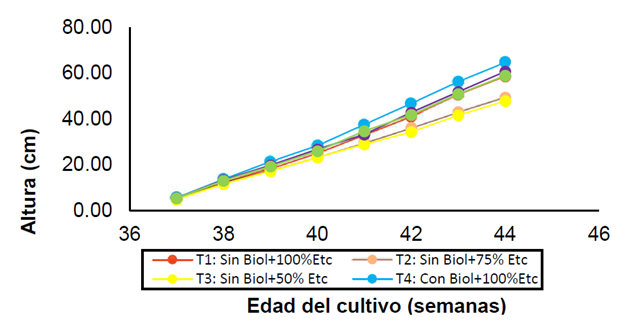Molecular Characterization of Bacterial Isolates of the Biol Elaborated with Native Mountain Microorganisms and its Ef fect under Deficit Irrigation Conditions on Bell Pepper (Capsicum annuum L.)
DOI:
https://doi.org/10.28940/terralatinoamericana.v43i.2192Keywords:
bacteria, water ef ficiency, evapotranspirationAbstract
The search for sustainable agronomic strategies is essential to address water scarcity and mitigate the negative impacts associated with conventional agricultural practices. In this context, this study aimed to molecularly characterize bacterial isolates from a biol prepared with native mountain microorganisms and to evaluate their interaction with deficit irrigation in bell pepper (Capsicum annuum L.) cultivation. Six treatments were implemented: T1, 100% of crop evapotranspiration (ETc) without biol; T2, 75% of ETc without biol; T3, 50% of ETc without biol; T4, 100% of ETc with biol; T5, 75% of ETc with biol; and T6, 50% of ETc with biol. For molecular characterization, PCR products were analyzed using the BLAST tool in the GenBank® database.
The results of 16S rRNA gene sequencing revealed the presence of bacteria such as Enterobacter asburiae, Enterobacter hormaechei, and Serratia marcescens, and also indicated the formation of two distinct subgroups. Regarding agronomic variables, the use of biol at 100% ETc (T4) was superior in terms of plant height, commercial fruit weight, and yield, whereas 50% ETc without biol (T3) showed the lowest values in all evaluated variables. Conversely, treatment T6 stood out for its water use ef ficiency, achieving a yield of 30.73 kg m–³. The use of biol improves the agronomic performance of bell pepper cultivation and allows a reduction of up to 50% in water consumption without significantly af fecting yield.
Downloads
Publication Facts
Reviewer profiles N/A
Author statements
- Academic society
- Terra Latinoamericana
- Publisher
- Mexican Society of Soil Science, C.A.

















